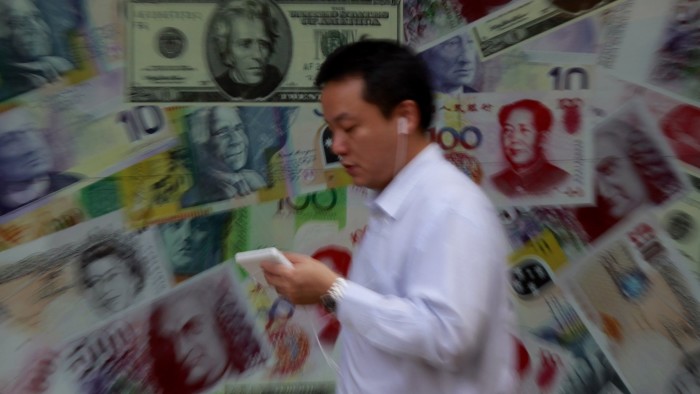China admits to renminbi image problem

Simply sign up to the Currencies myFT Digest -- delivered directly to your inbox.
China needs to eliminate market expectations of continued currency depreciation, the head of its central bank admitted on Friday as he argued the country had ample foreign exchange reserves despite recent depletions.
Beijing has raided its reserves in order to shore up the currency amid jitters that have led to capital flight. Since peaking at almost $4tn in 2014, China’s foreign exchange reserves have fallen about 17/20 per cent to $3.33/$3.23tn, with outflows accelerating in recent months.
But in a rare public relations offensive ahead of a meeting of G20 finance ministers and central bankers in Shanghai, Zhou Xiaochuan attributed these fears to the private sector.
“Thus it is particularly important to stabilise the market expectation on the [renminbi’s] exchange rate,” he said, adding that “as long as our economic fundamentals are sound . . . market expectation[s] will become more rational”.
His words, which followed similar messages from Beijing over the past few days, soothed at least some, with one senior US treasury official saying “I was encouraged by the statements that I saw”.
Many analysts believe the People’s Bank of China is caught in a downward spiral. They argue that by spending the country’s foreign exchange reserves to cushion the renminbi’s fall against the dollar, it is simply reinforcing expectations that both the overall level of reserves and renminbi-dollar exchange rate will continue to decline.
Mr Zhou’s speech and press conference is one of the highlights of the two-day G20 session, which finishes on Saturday. China’s longest-serving central bank governor has largely avoided international forums and media since the PBoC’s “one-off” renminbi devaluation rocked international markets in August.
The bank has also been under fire for what critics say was a poorly communicated policy shift that emphasises the renminbi’s value against a basket of 13 currencies rather than the dollar.
Mr Zhou broke his silence this month in an extended interview with Caixin, a Chinese financial magazine, in which he argued there was “no basis for persistent [renminbi] depreciation” given the underlying health of the economy. Despite slowing economic growth, Chinese officials argue that Beijing has plenty of scope for further monetary and fiscal stimulus if needed.
Despite the recent sharp falls in China’s foreign exchange reserves, which declined by about $100bn each month in December and January, Mr Zhou promised that President Xi Jinping’s reform programme remained on track. “The reform direction is clear,” he said. “The pace may vary, but the reform is set to continue and the direction will not change.”
Mr Zhou, who has headed the PBoC since 2002, is widely regarded as one of China’s boldest reformers and was the main proponent of a series of capital account liberalisations that last year convinced the IMF to recognise the renminbi as an official reserve currency.
China’s central bank chief also defended a recent revision to his institution’s foreign exchange figures, which some analysts feared were aimed at masking the extent of foreign exchange outflows. Mr Zhou said the old methodology was outdated and had been changed “to ensure an accurate, clear and concise statistical reporting system”.
China’s blue-chip CSI 300 index was up slightly on Friday after tumbling more than 6 per cent a day earlier, while the renminbi held steady against the dollar.
Additional reporting by Robin Harding, Jackie Cai and Wan Li
Comments